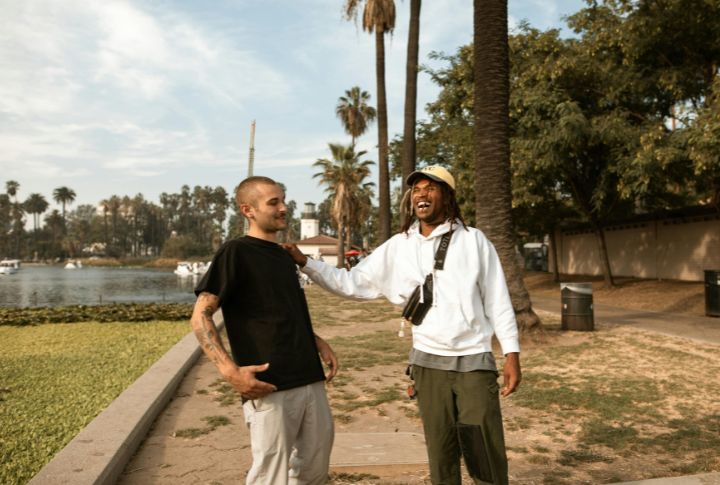
In the hustle of everyday talk, a quiet group speaks with unwavering authenticity. These individuals intentionally choose their words, avoiding specific expressions as if dodging unseen obstacles. They are intrigued by what sets their conversations apart. Let’s delve into the 15 phrases you won’t hear from them.
“I’m fine.”

When faced with turbulence, real folks shun the common retort, “I’m fine.” Embracing openness, they prefer revealing their actual states and nurturing deeper connections. Such a phrase, a facade for concealed distress, rarely escapes their lips as they prioritize transparency over evasion.
“Just kidding!”

Uttering sharp comments followed by “Just kidding!” contradicts the ethos of truthful personalities. Committing to their promises, these people eschew the need for such disclaimers. Prioritizing kindness and sincerity, they avoid making statements that would necessitate retracting them with insincere jest.
“Sorry, but…”

An apology that comes with a “but” feels insincere. Trustworthy people realize the power of a heartfelt apology—one offered wholeheartedly, without excuses or qualifications. Comprehending that accountability fosters confidence and healing, they believe forthright apologies pave the way for stronger bonds and more profound perception.
“Trust me.”

For those whose actions consistently reflect their integrity, “Trust me” becomes redundant. Their dependable behavior and track record prevent verbal assurances, rendering this expression unnecessary, especially where allegiance is built on unwavering reliability rather than claims.
“No offense, but…”

Prefacing remarks with “No offense, but…” is seen as a precursor of insensitivity by those valuing authenticity. The real ones deliberate on their word choice, striving for honesty without resorting to veiled insults. This phrase, indicative of impending affront, rarely aligns with their approach to sincere dialogue.
“To be honest…”

Earnest beings don’t preface their truths with “To be honest…” Understanding their commitment to honesty is implicit. Suggesting some statements might be less truthful feels foreign to them, as frankness is woven into every facet of their communication.
“I don’t judge, but…”

“I don’t judge, but…” often precedes judgment, a contradiction authentic individuals avoid. Recognizing and openly addressing their biases, they do not need qualifiers that undermine their following words’ sincerity, maintaining a non-judgmental and open stance.
“You wouldn’t understand.”

Dismissive in nature, “You wouldn’t understand.” undervalues the potential for empathy and shared experiences. Reliable folks cherish the possibility of connection, never presuming someone’s incapacity to grasp their feelings or circumstances, fostering an environment of mutual recognition and respect.
“I hate to say it, but…”

Typically, what follows is something they don’t genuinely hate to say. Unpretentious souls don’t hide their criticisms or observations behind false reluctance. They offer feedback from a place of wanting to foster perceptiveness, not from a position of discomfort.
“It’s not personal.”

This utterance is primarily a way to detach from the impact of one’s behavior or words. Trustworthy individuals recognize that relationships are profoundly personal and engage with others with sensitivity, compassion, understanding, and an appreciation for the intimate nature of human connections.
“I could care less.”

Besides often being misused (the correct one is “I couldn’t care less”), it expresses apathy. Transparent beings care deeply about the world around them and the people in it. They’re invested in their passions and relationships, striving for meaningful engagement.
“I don’t need anyone.”

Everyone needs someone at some point, and acknowledging this is a strength. Candid personalities comprehend the value of vulnerability and interdependence. Cherishing their bonds, they recognize that seeking help is a sign of courage, not weakness.
“It’s not my problem.”

Empathy and compassion are hallmarks of the authentic. Refusing to dismiss struggles beyond their immediate concern, they offer support and affection instead. This expression contradicts their belief in human interconnectedness and the importance of helping others.
“I already know that.”

Openness to learning is critical for those who are faithful to themselves. Even if true-hearted souls are familiar with a topic, they listen, recognizing that every conversation is an opportunity to deepen understanding or see things from a new perspective.
“That’s just how I am.”

This statement can be a shield against growth and self-improvement. Sincere souls constantly evolve while accepting that change is part of life and are open to feedback and the idea that self-development is a lifelong journey.

Comments
Loading…